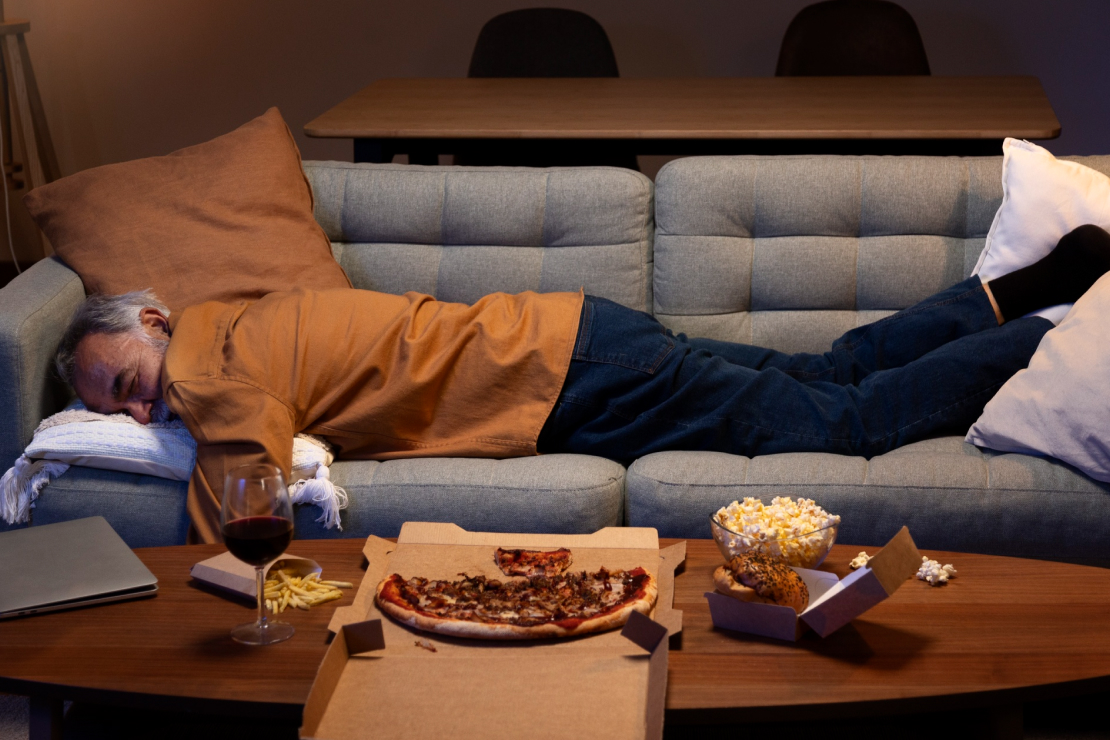Does Skipping Dinner Affect Sleep Quality? What the Research Says
Explore the complex relationship between skipping dinner and sleep quality. This guide delves into the science of how meal timing impacts your sleep architecture, hormones, and overall health.

Table of Content
The Evening Meal Dilemma: To Eat or Not to Eat?
The age-old advice to "eat breakfast like a king, lunch like a prince, and dinner like a pauper" has found new life in modern wellness circles, with many people adopting early time-restricted eating or skipping dinner altogether. While the metabolic benefits for weight loss are often discussed, a critical question remains: how does skipping dinner truly affect your sleep quality? The answer is complex, involving a delicate interplay of hormones, digestion, and our internal body clock.
The Science of Sleep and Digestion
Your body's sleep-wake cycle, or circadian rhythm, is intricately linked to your digestive system. During the day, your metabolism is primed for eating and digesting. As evening approaches, your body naturally prepares for rest and repair, and digestive processes slow down. Eating a large meal close to bedtime can disrupt this natural rhythm.
- Metabolic Slowdown: Your metabolism naturally slows in the evening, making it less efficient at processing a large influx of calories.
- Thermic Effect of Food (TEF): The energy required to digest food can raise your body temperature, which is counterproductive to the natural drop in temperature needed to initiate sleep.
- Hormonal Shifts: Eating triggers the release of insulin, which can interfere with the production of melatonin, the primary sleep hormone.
Impact on Sleep Architecture
Meal timing doesn't just affect falling asleep; it influences the very structure of your sleep. Sleep architecture refers to the cyclical pattern of sleep stages, including light sleep, deep sleep (slow-wave sleep), and REM (Rapid Eye Movement) sleep.
- Deep Sleep: This is the most restorative stage, crucial for physical repair and memory consolidation. Eating a heavy meal late at night can reduce the amount of deep sleep you get as your body diverts resources to digestion.
- REM Sleep: This stage is vital for emotional regulation and learning. Some studies suggest that late-night eating can delay the onset of the first REM cycle and reduce its duration.
- Sleep Fragmentation: Digestive discomfort, bloating, or acid reflux from a late meal can lead to micro-awakenings, fragmenting your sleep and leaving you feeling unrefreshed even after a full night in bed.
Potential Benefits of Skipping Dinner for Sleep Quality
For many, fasting in the evening can lead to significant improvements in sleep.
| Benefit | Mechanism | Impact on Sleep |
|---|---|---|
| Improved Digestive Rest | Allows the digestive system to be inactive during sleep. | Reduces the risk of acid reflux, bloating, and indigestion, which can cause awakenings. |
| Enhanced Growth Hormone (GH) Release | Insulin (triggered by food) suppresses GH. Fasting allows for a more robust natural GH pulse during deep sleep. | Promotes better cellular repair, muscle recovery, and fat metabolism overnight. |
| Better Circadian Rhythm Alignment | Aligns the feeding window with daylight hours, reinforcing the body's natural clock. | Can lead to a more regular sleep-wake cycle and improved sleep onset latency. |
| Lower Core Body Temperature | Avoids the thermic effect of a large evening meal. | Facilitates the natural drop in body temperature required for falling asleep. |
Potential Drawbacks and Risks of Skipping Dinner
Despite the benefits, skipping dinner is not suitable for everyone and can sometimes negatively impact sleep.
- Hunger Pangs: Going to bed very hungry can make it difficult to fall asleep or can cause you to wake up in the middle of the night.
- Blood Sugar Drops (Hypoglycemia): For some individuals, especially those with blood sugar regulation issues, a long overnight fast can lead to a drop in blood sugar that disrupts sleep.
- Cortisol Spikes: For some, hunger can be a stressor, leading to an increase in the stress hormone cortisol, which is counterproductive to sleep.
- Nutrient Deficiencies: If not planned carefully, compressing your eating window can make it difficult to get all the necessary nutrients, which can indirectly affect sleep.
The Mind-Body Connection: Psychological Aspects
The evening meal is often deeply ingrained in our daily routines and social lives. For many, it's a time to unwind, connect with family, and de-stress. Skipping dinner can therefore present psychological challenges.
- Habit and Ritual: The habit of eating at a certain time can create a powerful psychological expectation. Breaking this can initially feel unsettling.
- Emotional Comfort: Many people use food, particularly in the evening, as a source of comfort or as a reward after a long day. Removing this coping mechanism without a replacement can be difficult.
- Social Implications: Dinner is a primary time for social interaction. Navigating social events or family meals while fasting requires planning and communication.
Who Is Most Likely to Benefit?
- Individuals with acid reflux or GERD.
- People who often feel bloated or have indigestion after dinner.
- Those looking to optimize their circadian rhythm and metabolic health.
- Individuals who are not prone to nighttime hypoglycemia.
Who Should Be Cautious?
- Diabetics or individuals with blood sugar regulation issues.
- Athletes with high energy and recovery needs.
- Individuals with a history of eating disorders.
- Pregnant or breastfeeding women.
Practical Strategies for Success
If you choose to skip dinner, do it strategically:
- Eat a Nutrient-Dense Last Meal: Ensure your last meal (e.g., a late lunch) is well-balanced with adequate protein, healthy fats, and fiber to promote satiety.
- Gradual Transition: Start by eating dinner progressively earlier each day, rather than cutting it out abruptly.
- Stay Hydrated: Drink plenty of water or herbal tea in the evening to help manage hunger.
- Develop a New Evening Routine: Replace the dinner ritual with other relaxing activities, such as reading, taking a warm bath, or gentle stretching.
The Role of Macronutrients in Your Last Meal
If you opt for an early dinner instead of skipping it entirely, the composition of that meal is key.
- Protein: Including a source of slow-digesting protein, like casein (found in cottage cheese) or lean meats, can promote satiety and provide a steady supply of amino acids for overnight muscle repair without a large insulin spike.
- Carbohydrates: A small portion of complex carbohydrates (like sweet potato or quinoa) can help promote sleep by aiding the transport of tryptophan to the brain, which is a precursor to melatonin. Avoid large amounts of refined carbs.
- Fats: Healthy fats can also promote satiety, but keep the portion small as they are calorie-dense and slow down digestion.
Conclusion: A Personalized Approach is Best
Skipping dinner can be a powerful tool for improving sleep quality and overall health for some, but it can be detrimental for others. The key is to listen to your body. If you find that fasting in the evening leads to restful sleep and energized mornings, it may be a great strategy for you. However, if it results in sleepless nights and intense hunger, a more traditional eating schedule with a light, early dinner is likely a better choice. Ultimately, the best approach is one that is sustainable and supports both your health goals and your individual well-being.
"The relationship between meal timing and sleep is not one-size-fits-all. The goal is to find a rhythm that allows your body to rest and repair optimally, whether that includes an evening fast or a light, early dinner."
Frequently Asked Questions
If I skip dinner, will I lose muscle?
Muscle loss is a risk with any form of fasting if overall protein and calorie intake are insufficient. To mitigate this, ensure your eating window includes adequate protein (1.6-2.2g per kg of body weight for active individuals) and consider strength training.
What can I have in the evening if I'm not eating dinner?
During your fasting window, you can have non-caloric beverages like water, herbal tea (chamomile, peppermint), and black coffee (if it doesn't affect your sleep).
How do I deal with social situations that revolve around dinner?
This is a major challenge. You can plan your fasting days around your social calendar, have a non-caloric drink while others eat, or adjust your eating window for that day. Flexibility is key to sustainability.
Start Your Health Journey Today
Download Macro Tracking AI and take control of your nutrition with the power of artificial intelligence.
Download on App Store

